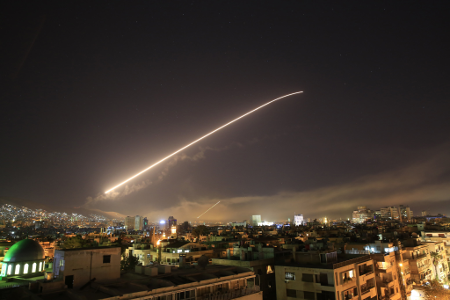 Photo courtesy of the Chicago Tribune
Photo courtesy of the Chicago TribuneLast night the USA, UK and France launched a joint military operation to strike against President Assad’s regime and the infrastructure suspected of delivering a chemical weapons attack in Douma earlier this week.
Public opinion is divided on whether this was the right course of action, especially with Russia’s support of the Syrian Government being a dangerous factor that risks considerable conflict escalation.
But, the decision to take these strikes was essentially about whether a Government should be allowed to get away with murdering its own men, women and children with barbaric chemical weapons. The answer to that has to be no.
All diplomatic responses up to this point have proved futile. The most powerful of condemnation from across the world’s governments, and the introduction of UN Security Council resolutions haven’t stopped the atrocities going on in Syria. The use of military action or violence should always be a last resort, and that’s the stage we’ve reached when it comes to Syria.
The international community is allowed, or rather obliged, to intervene where war crimes have been committed. Assad’s Government forces have committed many of these in Syria’s eight-year-long civil war, including several confirmed uses of chemical weapons against civilians prior to this week’s disaster in Douma. That demands action.
The raids made by western forces weren’t random or indiscriminate. These specifically targeted several key sites that intelligence leads to believe were involved in last week’s chemical attack, including:
- A scientific research facility in Damascus, allegedly connected to the production of chemical and biological weapons
- A chemical weapons storage facility west of Homs
- A chemical weapons equipment storage site and an important command post, also near Homs
In this case, the impact on civilians was explicitly designed to be minimal – which is in stark contrast to the attitude taken by Syria’s Government.
We’ve already seen a response from Russia, who have called an emergency session of the UN Security Council tomorrow. Of course, with their troops being actively involved in the fighting in Syria, it is imperative that action in Syria does not become a precursor to a far more threatening and devastating conflict. But that’s why the strikes were limited, and there is no guarantee or public plans for a repeat.
The goal of these air strikes was to act as a warning and a punishment to the Syrian Government, to deter further use of chemical weapons and to punish them for using them in the past. We’ve been down this road in the past, even just last year, and admittedly it’s not worked, but we’ve also seen that dialogue hasn’t worked either – air strikes at least provide a tangible loss for Assad and one that lessens his ability to do harm to the thousands more civilians that are potentially in his army’s crosshairs.
Syria has been in a state of civil war since 2010, and even through international pressure and, at times, action – there is no end in sight. The people of Syria have suffered more than they should ever have had to, and it has sparked the largest refugee crisis since the Second World War.
We will look back on Syria as a shameful example of the international community’s inaction.
The war in Syria will only end when President Assad finally relinquishes power, through threat of defeat by the revolutionary forces. Regime change is out of the question owing to Russia’s meddling hand in the conflict. How that comes about is almost impossible to answer, but western help for the opposition seems like the least worst option.
We’ve yet to see the full response from Syria’s air strikes, but in principle it was the right thing to do and something that the international community had to do. The next few weeks may prove to be a critical juncture in the war in Syria – but how many times have we said that in the past?